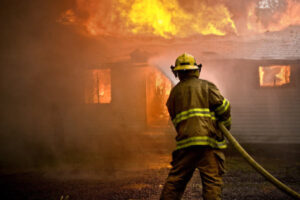Home insurance policies cover several catastrophic risks, including fires and lightning. Most even cover wildfires. Yet you might wonder what to expect from your insurance company if your house is severely damaged, and whether your coverage is sufficient.
What types of fires are covered?

All policies cover kitchen fires, electrical fires and fires resulting from lightning. A fire caused by an explosion, an oil spill, or a piece of burning debris falling from the sky would also be covered. And if you managed to contain and put out the fire but your property was damaged by the resulting toxic smoke, that damage would be covered too.
Wildfires are usually covered, though in high-risk areas, coverage may be limited or hard to find. Arson, when a person willfully causes a fire, is also covered. That’s provided the fire wasn’t started by a member of your family or anyone else mentioned on the policy.
Certain events are excluded from every policy. They include war, terrorism, nuclear explosions and earthquakes, though you can add earthquake coverage as a rider. If your home is vacant for an extended period, usually 30 days, fires are excluded. You can remedy this by purchasing a vacant home endorsement or policy.
What to do before and during a fire
Prevention is the first step in keeping your family safe from a fire. Make sure you have working fire and carbon monoxide detectors throughout the house and at least one fire extinguisher. The latter will enable you to put out a kitchen fire quickly or at least prevent it from spreading.
When your fire alarm goes off, grab the fire extinguisher and try to put out the fire. If you can’t extinguish the fire, leave the house immediately and call 911. If your normal evacuation route is blocked, find another way out. Crawl to avoid inhaling smoke. If you can’t leave the room you are in, close all doors, place a wet towel under the door and cover any vents to prevent the smoke from seeping in. Then wait for first responders to arrive.
Do not waste time gathering your valuables. Fires can spread quickly and cut off your escape route. Once you are out, stay out and keep a safe distance. Regroup and encourage everyone to remain calm. Once firefighters are on the scene, you can call your insurance company to file a claim.
What’s covered?
Home insurance will pay for damages resulting from a covered fire, up to the coverage limit. Most homeowners policies include the following:
- Dwelling (homeowners) coverage for damage resulting from the fire or caused by firefighters while putting it out. The coverage includes walls, ceilings, floors, embedded appliances, electrical and plumbing systems, and attached structures such as a garage. It includes debris removal.
- Other structures (homeowners) coverage for damage to sheds, garages, fences, trees and your lawn.
- Improvements (condo owner) coverage for any renovations or upgrades you’ve made to your condo unit. Damage to the building is covered under the condo corporation’s policy.
- Personal property coverage for all items you own that are damaged or beyond repair. You may need a rider to cover valuables.
- Liability coverage for if the fire originated in your home and damaged your neighbour’s property. Your liability coverage will pay for lawsuits and settlements. Liability covers any situation, anywhere in the world where you are found liable for causing damages.
Check your policy to see whether you have actual cash value or replacement cost coverage. Actual cash value factors in depreciation. The older something is, the greater the depreciation or loss of value. The cost to rebuild your home or replace your lost valuables may be much higher than the actual cash value.
Replacement cost coverage means your home and lost items will be replaced with new ones of equal value. You can even get enhanced replacement cost value in case your cost to rebuild is much higher than anticipated due to ordinance laws or other constraints. You can expect to pay more for replacement cost coverage.
As you can see, a standard home insurance policy provides a lot of coverage for a major fire. Your needs may be different or more extensive than the average household’s. Call your insurance broker to assess your needs or answer any questions you may have about your coverage, replacement cost coverage and home insurance endorsements.




Reliance Insurance proudly serves
Burnaby and the Vancouver area